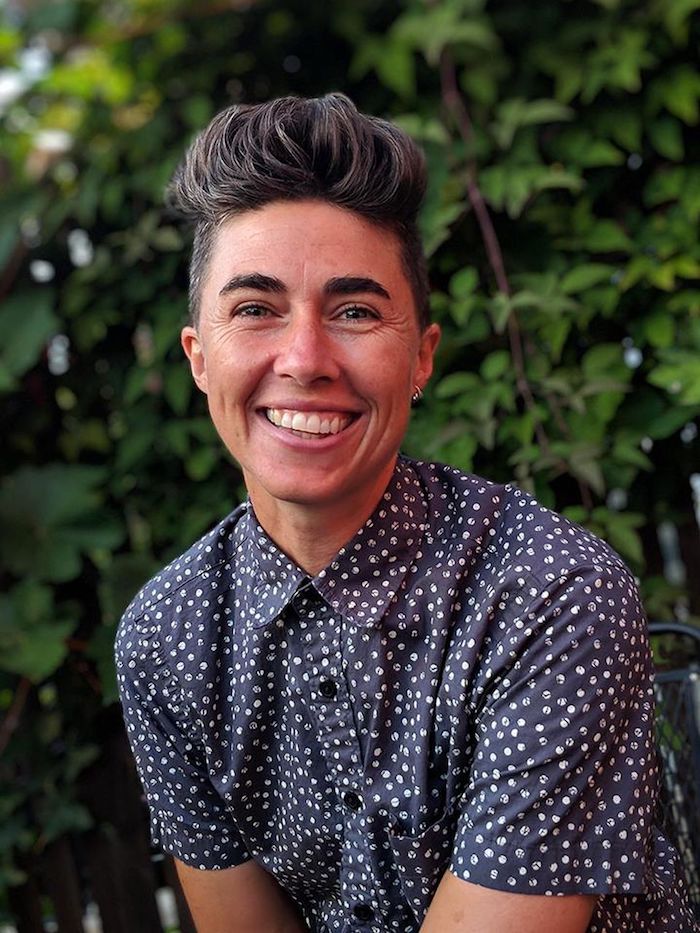
Katrina Spade wants to transform the U.S. funeral industry, making way for many more options for those facing death and for their families. She founded Recompose in 2017 to champion a dramatically new approach that reconnects death to natural cycles of life and engages people through meaningful participation. Ashoka’s Michael Zakaras caught up with Spade to learn more.
Michael Zakaras: What inspired your interest in the rituals and practices around death?
Katrina Spade: I had a moment around age 30 when I realized I was mortal, and I became curious about what would happen to my physical body when I died. Because my family is not religious and most of my friends aren’t either, I thought, what will they do? And I discovered that there are really just two options in the U.S.: cremation and conventional burial. Both practices poison the planet — this struck me as the wrong punctuation for lives lived in harmony with nature.
Zakaras: Why do we have just these two options?
Spade: Much of it is convention, it’s just the way things have been done. Take modern embalming. Many people think of it as a centuries-old tradition — but it became popular in the U.S. only during the Civil War. A couple of enterprising young people invented and marketed it to soldiers on the battlefield as a way to get their bodies home to their families — for advance payment. They used arsenic instead of formaldehyde back then. Today’s funeral practices, and many of our laws, are based on the dual practices of selling caskets and embalming bodies from 150 years ago.
Zakaras: How big is the funeral industry today?
Spade: About $20 billion dollars, and it’s an interesting industry, with many funeral homes passed down generation to generation and a few large corporations that own a lot of funeral homes. One of the things that’s so interesting is the idea that every person can “own” a piece of land for eternity, in the form of a cemetery plot. This is not a sustainable model, especially for cities with space constraints.
Zakaras: That’s a good point. How much land would you need to bury everyone in, say, New York City?
Spade: We’d need over 200 million square feet of land, or 7.5 square miles! And besides the land use, cemeteries are filled with metal, wood, concrete, and embalming fluid, a known carcinogen.
Many people consider cremation to be a more sustainable choice, and its popularity is rising: by 2035 an estimated 80% of Americans will be cremated. But actually, cremation is an energy-intensive process that releases greenhouse gases and particulates, emitting more than 600 million lbs of CO2 annually.
Zakaras: So what’s the alternative?
Spade: With Recompose, we asked ourselves how we could use nature — which has totally perfected the life/death cycle — as a model for human death care. We developed a way to transform bodies into soil, so that with our last gesture we can give back to the earth and reconnect with the natural cycles. We’re also aiming to provide ritual, to help people have a more direct and conscious experience around this really important event. As hard as it can be, the end of one’s life is a profound moment — for ourselves and for the friends and families we leave behind.
Zakaras: If you are successful, what will look different in 10 years?
Spade: I’m hopeful that we will have many options for the end of life — from hospice care all the way through disposition. It won’t be the odd family who says, “Maybe we should have a home funeral” — it’ll be every family that says, “Okay, how are we approaching this? What feels right to us?” And it will be normal to ask: “What do I want my end of life to look like? What will happen to my body? Where do I want to be when I die?” These are things that should be up to us, but we’ve never really felt that we had the agency or the cultural support to decide them.
The funeral industry would like us to think that it’s difficult or impossible for us to care for our own after a death, but humans have been doing that for millennia. There are a lot of reasons to take back some of that work, the work of caring for the dead, because there’s so much beauty inherent in it and it’s such a personal thing.
Zakaras: Why is this a particularly important moment for this work?
Spade: There’s a growing realization of climate change, coupled with this incredible cohort of baby boomers — 10,000 Americans turn 65 every day — who are approaching the end of their life or seeing someone go through death and thinking, “Is this really the best we can do?” This is a generation that’s really good at saying “Wait a minute, we can do better than this.”
Zakaras: Do you ever get tired of talking about death?
Spade: I never do! We have such a long way to go, but a new relationship with death is totally possible. One of my favorite sayings is “Death is not an emergency.” This is a wonderful reminder that the very first thing we should do when someone dies is pause and take a deep breath and just be in the moment.
